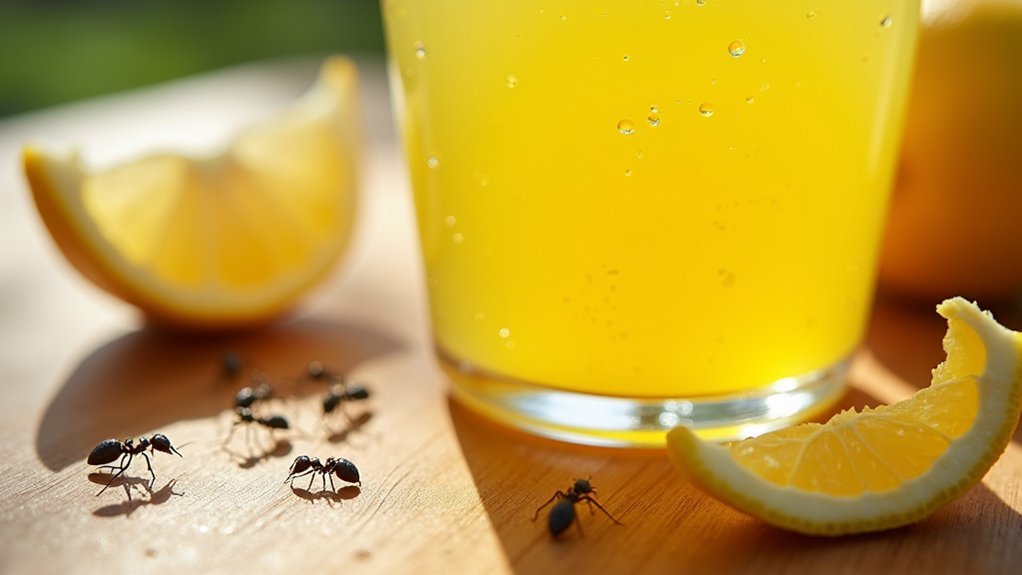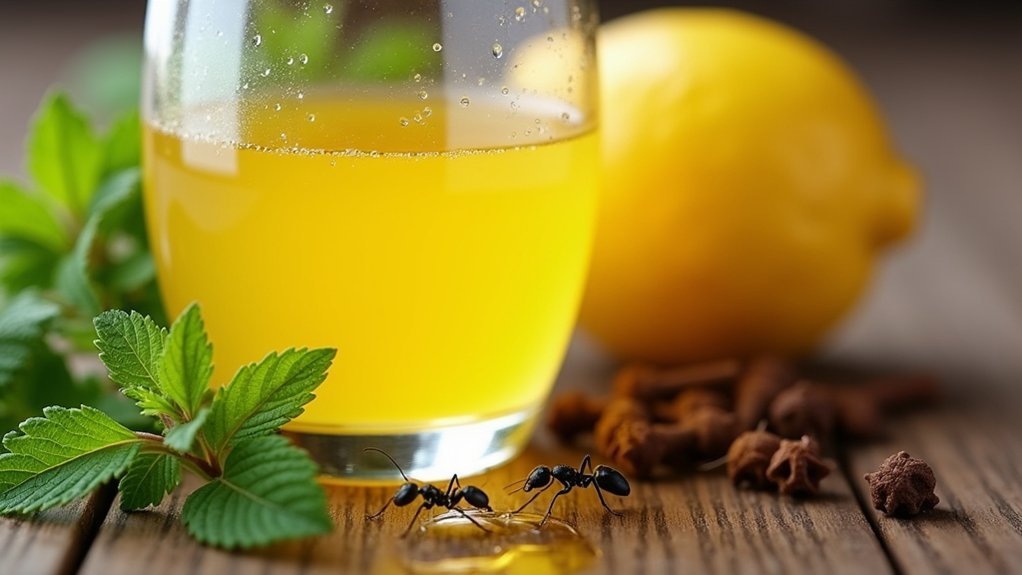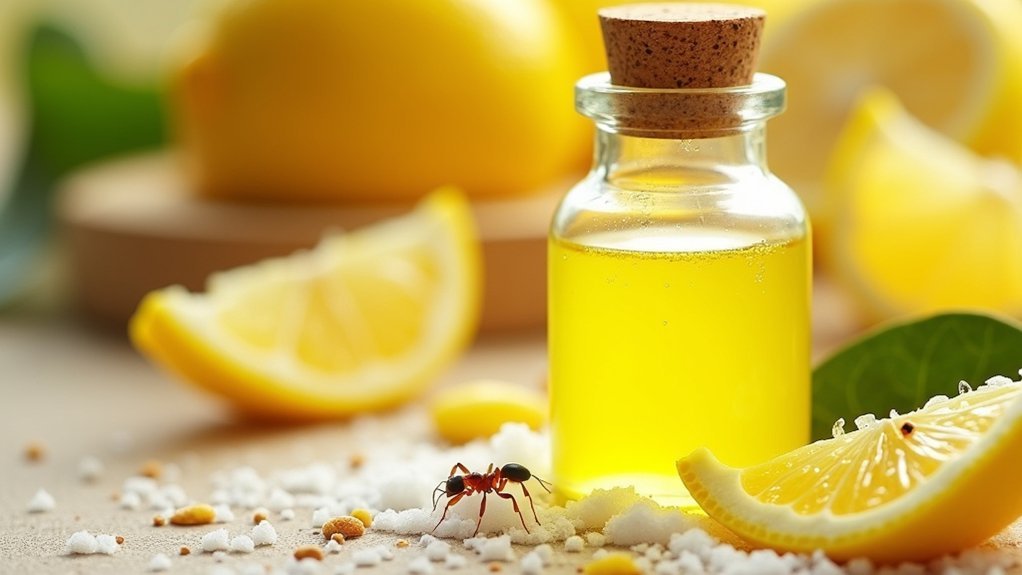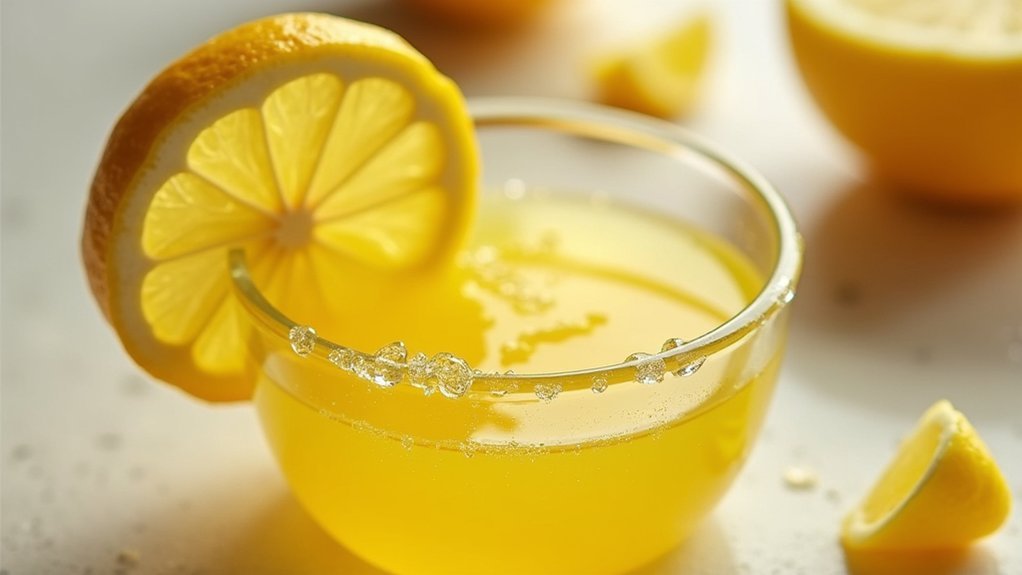Lemon juice creates an effective ant barrier by disrupting pheromone trails and overwhelming their sensory receptors. Mix one part fresh juice with three parts water, then spray entry points and pathways where ants travel. You’ll need to reapply regularly, especially after rain or cleaning. This natural solution costs pennies compared to commercial products that run £5-£20. The pleasant citrus scent offers an added bonus as you discover a safer alternative to chemical treatments.
Why Ants Hate Lemon Juice: The Science Behind the Repellent

While many household remedies come and go, lemon juice stands out as a surprisingly effective ant deterrent backed by scientific principles.
You’re not just masking odors—you’re disrupting their communication system. The citric acid in lemon juice interferes with ants’ pheromone trails, fundamentally erasing their chemical roadmaps and leaving them disoriented.
Ants’ sensory receptors react negatively to the acidity, creating an uncomfortable environment they’d rather avoid. The potent citrus scent that humans find invigorating acts as a natural repellent to these tiny invaders.
When you apply lemon juice to entry points and common pathways, you’re creating barriers they won’t cross.
As a non-toxic method, lemon juice offers effective ant control without endangering your family or pets—unlike many commercial insecticides.
How to Create and Apply Your Lemon Juice Ant Barrier
Creating an effective lemon juice barrier requires minimal preparation yet offers maximum protection against ant invasions.
Mix one part fresh lemon juice with three parts water in a spray bottle for easy application throughout your home.
A simple 1:3 lemon juice to water ratio creates the perfect spray solution for whole-home ant protection.
Target your spray directly on entry points like door frames, windowsills, and cracks to repel ants before they enter. For maximum effectiveness, apply the solution along existing ant trails to disrupt their scent trails and prevent other ants from following.
For enhanced protection, place lemon peels near entry points as an additional citrus deterrent.
Remember that consistency is key—regularly reapply your lemon juice mixture, especially after rainfall or cleaning, to maintain its effectiveness.
This simple, natural solution will help keep your home ant-free with minimal effort.
Combining Lemon Juice With Other Natural Repellents for Maximum Effect

Though lemon juice offers effective ant control on its own, combining it with other natural substances creates a powerhouse repellent that targets ants through multiple mechanisms.
Create a 50/50 solution of lemon juice and vinegar to effectively disrupt ant pheromone trails at entry points. For enhanced protection, mix lemon juice with water and cinnamon powder—this masks scent trails ants rely on for navigation.
Outdoor ant problems respond well to a puree of lemon peels and water poured directly into anthills. This nontoxic method eliminates colonies without environmental harm.
For stubborn infestations, pair lemon juice with diatomaceous earth; the acidity erases trails while DE damages exoskeletons. You’ll also find that adding essential oils like peppermint or tea tree to your lemon juice creates a stronger scent barrier, preventing future invasions.
Common Mistakes When Using Lemon Juice as an Ant Deterrent
Despite its natural repellent properties, many homeowners make essential errors when using lemon juice against ants, limiting its effectiveness.
You’re likely making the mistake of using undiluted lemon instead of mixing it with water in a 1:3 ratio for better coverage of areas where ants enter.
Another common household error is applying the solution once and expecting permanent results—regular reapplication is significant, especially after rain.
Don’t rely on lemon juice alone; complement it with ant traps or another household staple like diatomaceous earth for thorough protection.
Many people only treat visible ant trails while neglecting hidden entry points.
Remember that different ant species respond differently to citrus repellents, so you’ll need multiple strategies to effectively keep ants at bay.
Tracking Results: How to Tell if Your Lemon Juice Barrier Is Working

How can you determine if your lemon juice strategy is actually working against ant invaders? Start by observing ant behavior around areas where you’ve applied the solution. If they’re actively avoiding the treated zones, your barrier is effectively repelling them.
Monitor entry points closely over several days. A noticeable decrease in ant traffic crossing these boundaries indicates success.
You’ll also want to look for any dead ants near your lemon juice lines, which suggests the solution isn’t just deterring but eliminating some pests.
Keep tracking results over time. If ants return after a few days, it’s a sign you need to reapply your barrier.
Consistent monitoring will help you determine if your lemon juice approach remains effective or requires adjustment for ideal protection.
Cost Comparison: Lemon Juice vs. Commercial Ant Control Products
You’ll find lemon juice solutions remarkably cost-effective compared to commercial ant control products, with an initial investment of just pennies versus £5-£20 for store-bought traps or £165+ for professional services.
Your DIY approach eliminates ongoing expenses of chemical repellents, creating significant long-term savings through simple ingredients you likely already have at home.
The straightforward preparation requires no specialized equipment, further reducing your overall ant control costs while delivering comparable effectiveness to many commercial alternatives.
Initial Investment Analysis
When comparing ant control options, lemon juice stands out as remarkably cost-effective against commercial alternatives. You’ll spend less than $1 per application using fresh lemons or bottled lemon juice, while professional pest control services can cost around £165 for just the initial visit.
The financial advantage becomes clear when you consider:
- Your kitchen likely already contains the household ingredients needed for this eco-friendly solution.
- Commercial ant traps and sprays typically cost $10-$30, while your DIY lemon juice spray costs pennies.
- A simple 1:3 lemon-to-water ratio creates an effective spray solution without specialized equipment.
- You’ll avoid recurring costs associated with professional ant management services and follow-up treatments.
This affordable approach lets you tackle ant problems without chemicals or significant financial investment.
Long-Term Cost Effectiveness
Looking beyond the initial outlay, lemon juice solutions deliver exceptional value compared to commercial ant control options.
While professional pest control services can cost between £60-£165 for initial treatments alone, a single lemon priced at just £0.30-£0.50 creates multiple applications when mixed with water.
The financial benefits compound over time. Commercial ant control often requires recurring visits, potentially exceeding £300 annually for persistent infestations.
You’ll avoid these ongoing expenses by implementing your own lemon juice barrier.
This natural ant repellent isn’t just cost-effective—it’s also eco-friendly.
By choosing lemon juice over chemical treatments, you’re saving money while eliminating potentially harmful substances from your home environment.
This sustainable approach to ant control provides both immediate savings and long-term financial benefits without compromising effectiveness.
DIY Savings Breakdown
The concrete financial advantages of lemon juice ant control become clearer when we examine a side-by-side cost breakdown.
When you use lemon juice to navigate ant problems around your home, you’ll spend merely $0.50 per application versus $165 for professional pest control visits.
- A simple 1:3 lemon juice-to-water ratio effectively kills ants while costing 97% less than commercial alternatives.
- No need for follow-up treatments at $60 each—just reapply your DIY ant solution as needed.
- Zero additional expenses for child and pet safety measures, unlike with chemical-based products.
- Savings over time accumulate considerably, especially during peak ant seasons.
These tips and tricks for using lemon juice not only solve your ant problem but also preserve your household budget while providing a pleasant citrus scent.
Frequently Asked Questions
Will Lemon Juice Keep Ants Away?
Yes, lemon juice will help keep ants away. You’ll find it disrupts their scent trails due to its acidity. Mix one part juice with three parts water and spray it where you’ve seen ants.
How to Make Lemon Ant Spray?
To make lemon ant spray, mix one part fresh lemon juice with three parts water in a spray bottle. You’ll get an effective repellent that disrupts ant scent trails when applied to entry points and pathways.
What Smell Do Ants Absolutely Hate?
Ants absolutely hate citrus smells like lemon and orange. You’ll find they’re also repelled by peppermint, tea tree oil, cinnamon, and vinegar. These strong scents disrupt their pheromone trails and navigation systems.
What Is the Best Homemade Outdoor Ant Killer?
You’ll find boiling water most effective for outdoor ant control. Pour it directly onto ant hills to reach the queen. Vinegar/water mixtures and diatomaceous earth also work well as secondary treatments around your yard.
In Summary
You’ve now discovered lemon juice’s remarkable ant-repelling powers. By creating effective barriers, combining it with other natural solutions, and avoiding common application mistakes, you’re armed to tackle any ant invasion. Remember to track your results for maximum effectiveness. When you’re weighing options, you’ll find this citrus solution isn’t just eco-friendly—it’s also gentler on your wallet than commercial alternatives. Try it today!





Leave a Reply